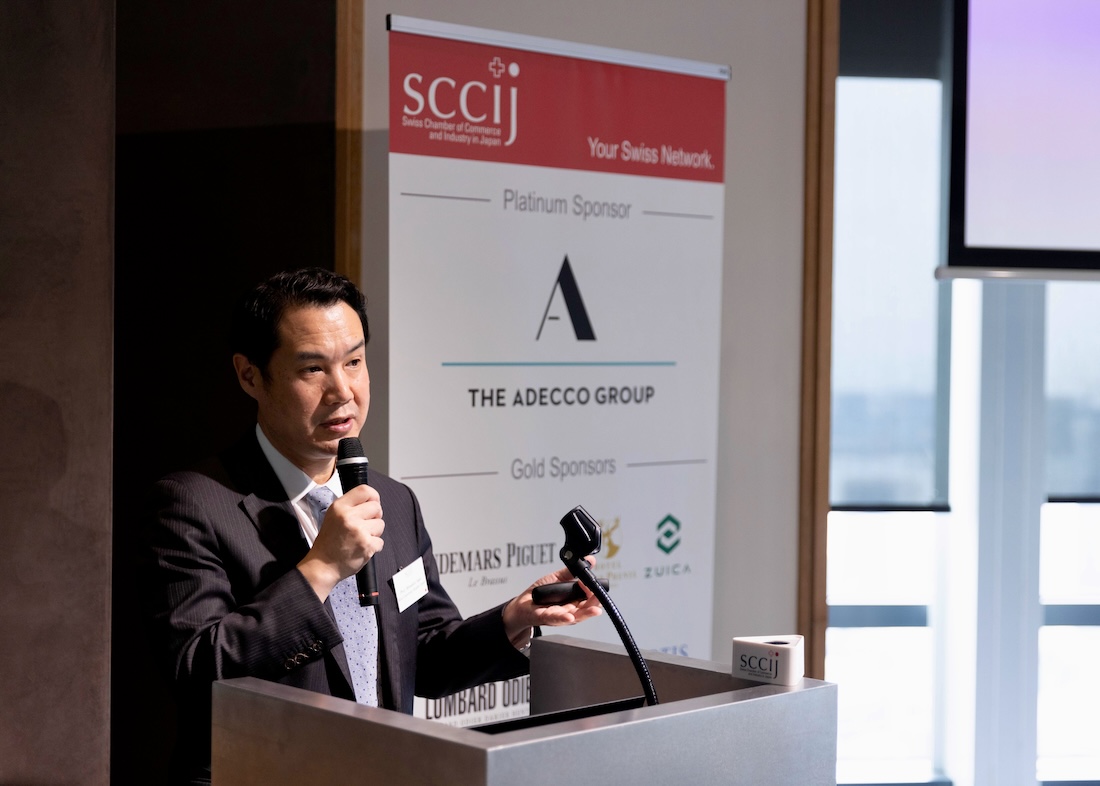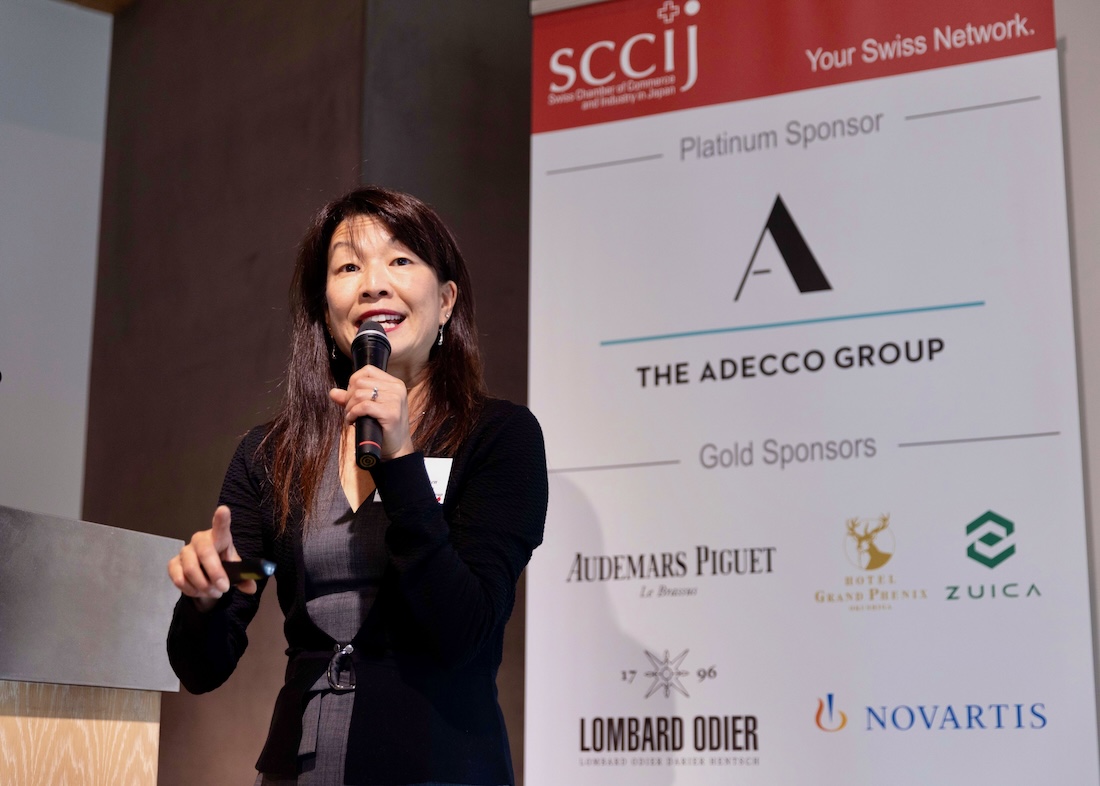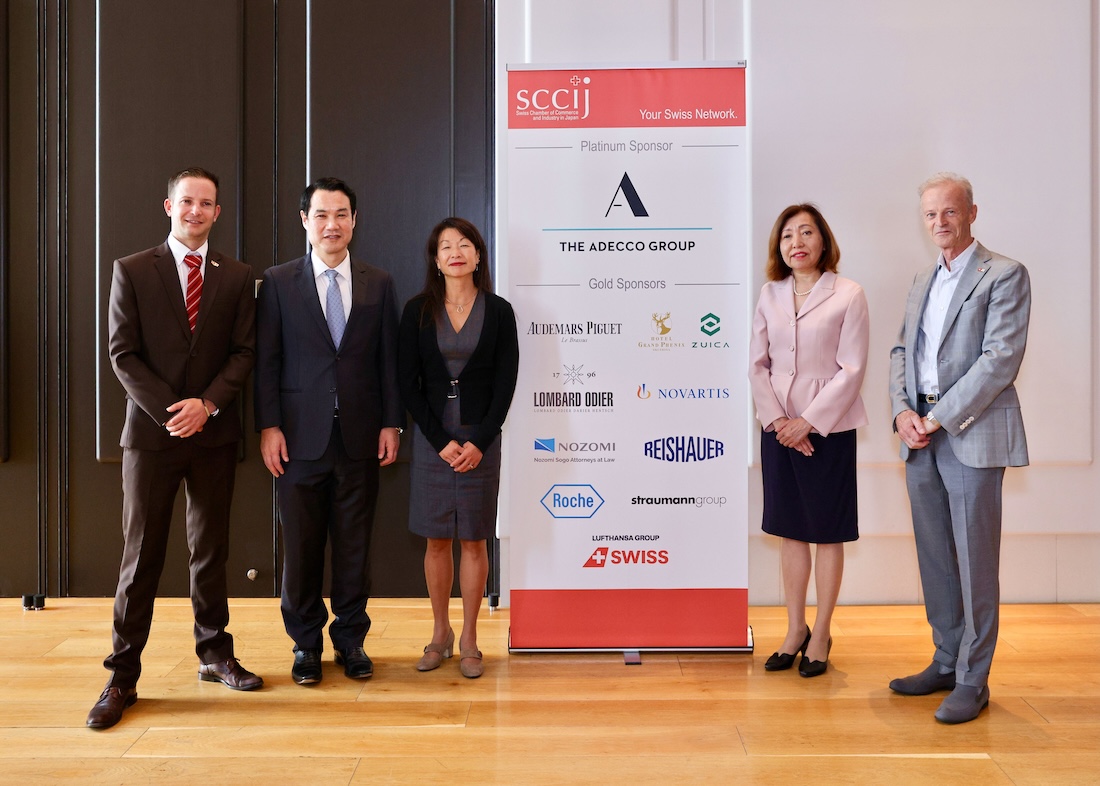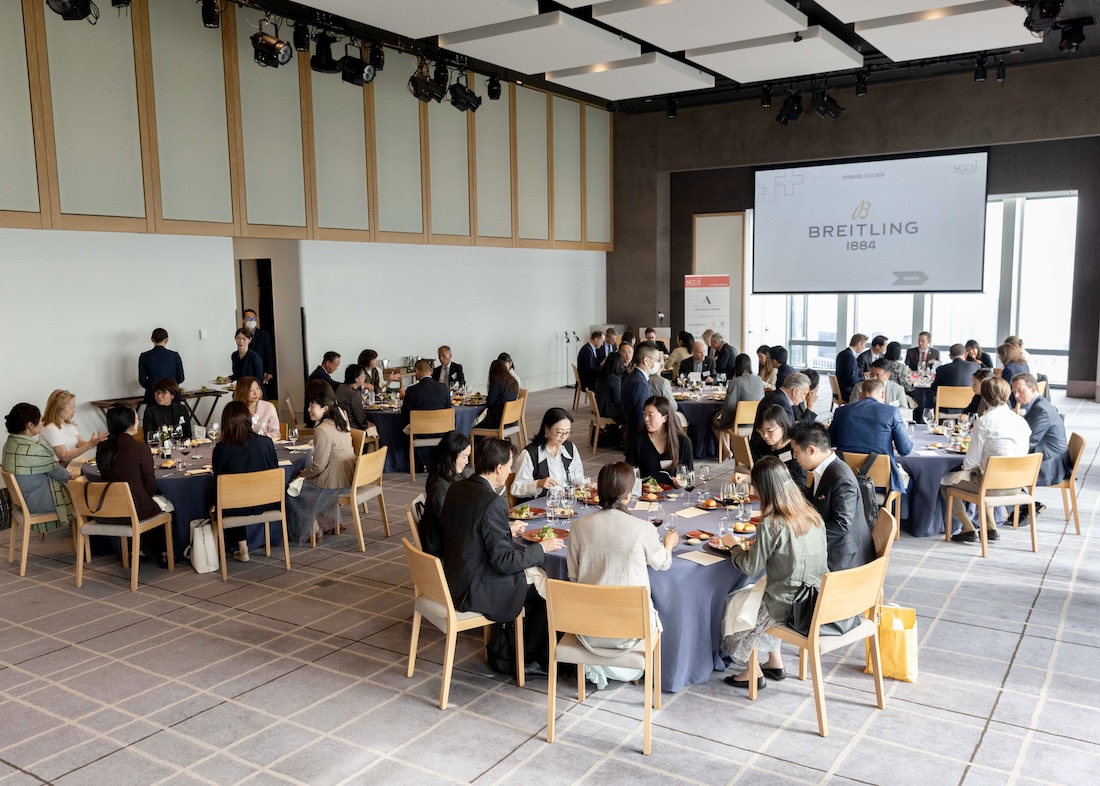Tokyo (SCCIJ) – How can companies promote the mental health of their employees? This question was the focus of the October luncheon attended by more than 50 SCCIJ members and guests. The speakers were Prof. Mitsuhiro Sado, Director of the Keio University Mindfulness & Stress Research Center, and Ms. Cynthia Hansen, Managing Director of the Innovation Foundation – Empowered by the Adecco Group. Having already identified mental health as a focus area in 2021, the SCCIJ sought to contrast the latest insights and perspectives on mental health from both clinical and corporate approaches. We summarize the luncheon presentations in Q&A form.

SCCIJ October Luncheon speaker Prof. Mitsuhiro Sado, Director of the Keio University Mindfulness & Stress Research Center.
Professor Sado, how important is mental health and mental well-being?
Mitsuhiro Sado: Neuropsychiatric disorders account for about 28% of global non-communicable diseases. Compare that with cancer at 11% and cardiovascular disease at 20%. Even more, I would like to remind you of a famous saying: “There is no health without mental health”.
What about the social and economic costs of these diseases?
M. Sado: We must distinguish between schizophrenia, depression, and anxiety. There is the cost of mortality when people die prematurely because of mental illness, there is the cost of unemployment when such people are unable to join the regular workforce. Finally, there are the costs of absenteeism – employees who are on sick leave – or presenteeism when people are at their workplace but not performing as well as healthy employees.
How can doctors, institutions, and companies help such patients?
M. Sado: We need to distinguish between first-line treatments, depending on the severity of the depression, and the longer-term view. The risk of relapse and recurrence of depression within a year of remission is about 60% when the patients have three or more previous episodes. Evidence shows that antidepressants need to be taken for at least six months after remission to prevent relapse. Cognitive behavioral therapy is also recommended for cases with recurrent episodes, and mindfulness-based cognitive therapy for remitted cases with three or more episodes.
What is a mindfulness-based cognitive behavioral therapy?
M. Sado: This group therapy requires eight weeks with a two-hour session. It consists of a practical part with meditation and yoga, a sharing experience, exercises, and homework. If you combine this therapy with usual care, the relapse rate drops from 66% to 37%. This group therapy can also effectively improve the mental health of corporate employees. We do not yet know whether it can improve productivity. To find the answer we have conducted a trial for the Ministry of Education, and the results are expected early next year.

SCCIJ October Luncheon speaker Cynthia Hansen, Managing Director of the Adecco Group’s Innovation Foundation.
Ms. Hansen, why should companies care about mental health?
Cynthia Hansen: When we look at how, where, and why we work, it is critical to consider four complementary dimensions of health and well-being: physical, mental, social, and purpose. These make up the Workforce Vitality model we developed at the Innovation Foundation. Of these dimensions, mental health is often neglected although it has a profound impact on one’s ability to work. In fact, it is one of the biggest differentiators for companies on the “2023 Fortune 100 Best Companies to Work For” list.
But how do you tackle such a big challenge?
C. Hansen: We developed a framework that can be used by any organization. To do this, we scanned what was working and failing in the ecosystem. Then, we put together a multi-stakeholder working group to tackle the problem and made it as broad as possible, including a psychiatrist, and representatives of the sports industry, of a design firm, and of public affairs; all kinds of people. We put them through a design process to find the best possible solution for better health and they came up with many ideas, from lotteries to mindfulness. We tested these ideas with end users and found that the most promising solution was the one that treated the end user as a whole person. The end-user was looking for a “personalized” offering.

Members and advisors of the SCCIJ Executive Committee together with October Luncheon speakers Prof. M. Sado and Ms. C. Hansen.
Why hasn't this been found out before?
C. Hansen: Most strategies looked at physical and mental health, but neglected the social dimension and missed the purpose aspect. According to our findings, there are four enablers: culture & brand, policy & practice, environment, and technology & tools. You need a combination of them to ensure effective solutions. We heard of a shocking example of failure: A mental health hotline with a telephone number you had to call from inside the company and that was available only during business hours. No one used this line because the caller’s number was traceable. People had to suspect that the number would be reported to the HR department.
Please give us a positive, successful example from your experience.
C. Hansen: We were looking for a way to promote positive interaction between employees in the company. A simple catering option activated the four enablers. The culture and brand part: We use a catering service that stocks refrigerators with healthy, local food and also cleans them. People can take a break with food from the fridge and enjoy lunch together. The policy & practice: The company did not allow eating at your desk or in conference rooms. You had to take a break to eat. The environment: The company also redesigned the office and put in a beautiful lunch area. Even the CEO comes there for lunch and you can see him eating and talking to people. The tools and technology part: If you buy your lunch between 10 a.m. and 2 p.m., the company pays for part of it – another idea to foster participation. The combination of the four elements and four enablers created the right environment for a successful solution.

The SCCIJ October Luncheon took place at the Andaz Tokyo Toranomon Hills.
About the speakers
Professor Mitsuhiro Sado is a psychiatrist and professor at Keio University Health Center. He is also the director of the Keio University Mindfulness & Stress Research Center. He holds a Master’s degree in Health Policy Planning and Financing from the London School of Economics and the London School of Hygiene and Tropical Medicine.
Cynthia Hansen joined the Adecco Group in 2017 to establish the company’s first global foundation, The Innovation Foundation, which operates as a social innovation lab. Previously, Ms. Hansen held senior positions at the World Economic Forum (WEF), Action Planning, the World Affairs Council of Washington State, and the Amity Institute.
Text: Martin Fritz for SCCIJ, Pictures: Stanislav Kogiku for SCCIJ





























